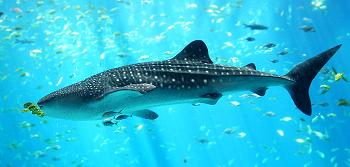One hundred and thirteen countries have signed on to an agreement to protect seven migratory sharks currently threatened with extinction byway of the Convention on the Conservation of Migratory Species of Wild Animals (CMS), according to the UN Environment Program (UNEP). The agreement prohibits hunting, fishing, or deliberate killing of the great white shark, basking shark, whale shark, porbeagle shark, spiny dogfish, as well as the shortfin and longfin mako sharks. However, Australia has declared it will ignore certain protections.
“This first global CMS instrument on commercially exploited species is a decisive step forward in international shark conservation,” said CMS Executive Secretary Elizabeth Mrema in a press release. “Wildlife conventions, UN agencies and international fisheries need to work together to prevent these creatures that roam the world’s oceans from becoming extinct.”
 According to the UNEP the whale shark, the world’s largest shark and fish species, has become a luxury meat item. Pictured here is a whale shark in the Georgia Aquarium. Photo by: Zac Wolf. |
According to the IUCN Red List 32 percent of open ocean sharks and rays are currently threatened with extinction. Long gestation periods, few young, and long maturation makes sharks particularly vulnerable to fishing and other human impacts on the ocean. In just 15 years sharks have been devastated in the Mediterranean and the Gulf of Mexico: with a 90 percent drop in populations. Shark populations have dropped by 75 percent in the northwestern Atlantic over the same time period.
Sharks are not just threatened by targeted fishing for their fins or meat. Sharks populations are also in decline due to bycatch, pollution, habitat destruction, depletion of prey species, collisions with boats, and climate change, according the the UNEP.
Despite being a signatory of CMS, Australia says it will not protect three of the species: the porbeagle shark, the shortfin mako, and the longfin mako sharks. Environment Minister Peter Garrett said that Australia will move to make a law removing those species from protections. Garrett argued that sharks in Australian waters are faring better than those in other parts of the world and protecting those species will hurt recreational fisheries.
While the agreement is set to aid seven species, the IUCN Red List found that 35 species of open ocean sharks and rays face extinction.
Status of individual species:
Endangered, 4 species
Ornate eagle ray Aetomylaeus vespertilio;
Giant devilray Mobula mobular ;
Scalloped hammerhead Sphyrna lewini ;
Great hammerhead Sphyrna mokarran.
Vulnerable, 16 species
Whale shark Rhincodon typus;
Smalltooth sand tiger Odontaspis ferox;
Pelagic thresher Alopias pelagicus;
Bigeye thresher Alopias superciliosus;
Thresher shark Alopias vulpinus;
Basking shark Cetorhinus maximus;
Great white Carcharodon carcharias;
Shortfin mako Isurus oxyrinchus;
Longfin mako Isurus paucus;
Porbeagle shark Lamna nasus;
Tope shark Galeorhinus galeus;
Oceanic whitetip shark Carcharhinus longimanus;
Dusky shark Carcharhinus obscurus;
Sandbar shark Carcharhinus plumbeus;
Night shark Carcharhinus signatus;
Smooth hammerhead Sphyrna zygaena.
Near threatened, 15 species
Frilled shark Chlamydoselachus anguineus;
Bluntnose sixgill shark Hexanchus griseus;
Spotted eagle ray Aetobatus narinari;
Manta Oceanic Manta birostris;
Spinetail devilray Mobula japanica;
Crocodile shark Pseudocarcharias kamoharai;
Silvertip shark Carcharhinus albimarginatus;
Bronze whaler Carcharhinus brachyurus;
Spinner shark Carcharhinus brevipinna;
Silky shark Oceanic Carcharhinus falciformis;
Galapagos shark Carcharhinus galapagensis;
Bull shark Carcharhinus leucas;
Blacktip shark Carcharhinus limbatus;
Tiger shark Semipelagic Galeocerdo cuvier;
Blue shark Prionace glauca.
Related articles
Actions taken to save sharks ‘disappointing’
(11/15/2009) Environmentalists say that the International Commissions for the Conservation of Atlantic Tuna (ICCAT) did not do enough in their yearly meeting to protect the ocean’s sharks.
Over 30 percent of open ocean sharks and rays face extinction

(06/25/2009) The first global study of open ocean (pelagic) sharks and rays found that 32 percent of the species are threatened with extinction largely due to overfishing and bycatch, making pelagic sharks and rays more threatened than birds (12 percent), mammals (20 percent), and even amphibians (31 percent), which are considered to be undergoing an extinction crisis. The situation worsens when only sharks taken in high-seas fisheries are considered: 52 percent of these species are threatened.
Sharks in trouble after nations fail to create sustainable management programs
(11/06/2008) Sharks are disappearing from the ocean at startling rates: currently one-in-five of these famous marine predators are threatened with extinction. According to a report from the Australian Government and TRAFFIC—an organization that monitors wildlife trade both legal and illegal—the collapse of shark populations is being caused largely by rising demand for shark fin in Asia. The report shows that legal fishing for sharks has become nearly as detrimental as illegal, since few fisheries have management strategies concerned with sustainability.







